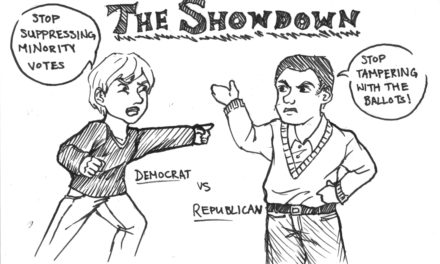Conflicting and confusing rules governing student elections were the central issue of last spring’s complicated election season at Emory. Competing candidates in the Residence Hall Association (RHA) and Student Government Association (SGA) levied allegations of cheating and inappropriate social media use at one another, prompting hearings, appeals and deliberations that prolonged the election period well into the end of the school year.
The result of all the back-and-forth: one collective headache for student legislators, candidates, community members and Wheel editors alike. Unfortunately, the problem is not a new one. According to SGA President and College senior Raj Patel, allegations of cheating have arisen in almost every election in the past 10 years. In an attempt to settle the confusion, SGA has established a new task force to unify all University elections under one elections board. The group is charged with the task of enumerating a set of rules to govern University-wide elections. They convened for the first time on Oct. 9.
We at the Wheel are pleased that SGA is taking the necessary steps to clear up the elections process and encourage the task force to establish clear guidelines about fair and legal campaigning for candidates. We feel that a set timeline outlining when candidates may campaign and what mediums they may use to do so – Facebook, Twitter, email or otherwise – is a necessary addition to the code. Further, since social media forums change so frequently, the task force should provide for the possibility of constant updates in the years to come.
Questions involving the appropriate use of social media are especially pertinent to the task force’s considerations. Should candidates be able to post a Facebook status or cover photo with a link to the poll the day of a University-wide election, or should they cease to post campaign-related materials? Should candidates be allowed to contact students directly over Facebook or email asking them to vote on the day of elections? The rules concerning these questions – and many others – should be realistic, enforceable and clearly communicated.
The elections task force could also recommend ways to promote higher voter turnout. For instance, a neutral third-party group like the Office of Student Leadership and Service could plan some sort of election-day celebration in Asbury Circle that brings students together to vote and enjoy free food and music.
University elections play an important role in the life of the student body and we feel that controversies like last year’s – or those in years past – distract from the true purpose of the elections. Student leaders play a very important role on our campus; so ensuring their elections are conducted fairly is critical.
We hope that SGA’s task force will thoughtfully consider how to clarify the gray areas that have complicated elections in years past. After all, it is never too late for a smoothly-conducted election season to instill confidence in the system again.
The above staff editorial represents the majority opinion of the Wheel‘s editorial board.
The Emory Wheel was founded in 1919 and is currently the only independent, student-run newspaper of Emory University. The Wheel publishes weekly on Wednesdays during the academic year, except during University holidays and scheduled publication intermissions.
The Wheel is financially and editorially independent from the University. All of its content is generated by the Wheel’s more than 100 student staff members and contributing writers, and its printing costs are covered by profits from self-generated advertising sales.






The elections are a farce. Most people never listen to the candidates’ positions and instead vote for whoever is the most popular.